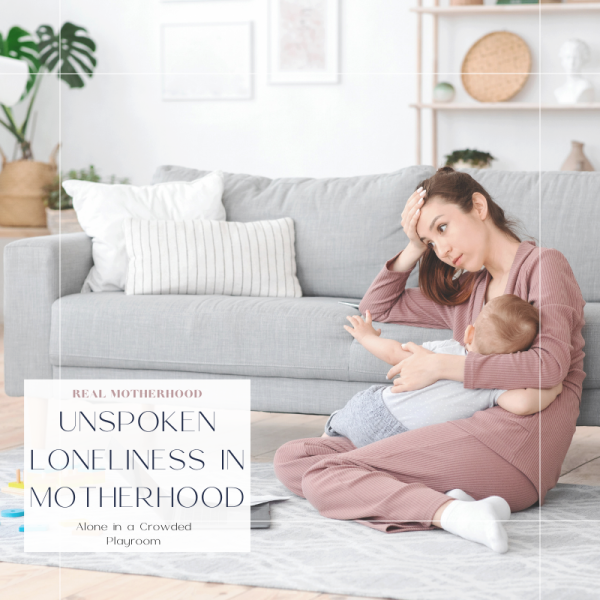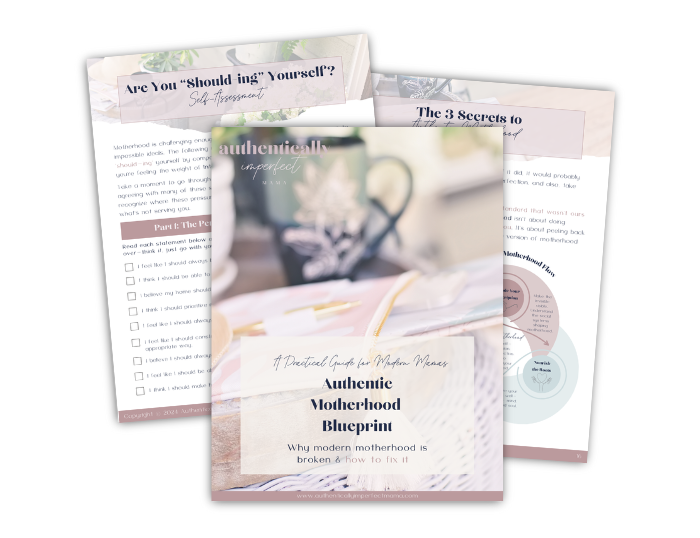Since becoming a mother three and half years ago, I can count on one hand the number of times I’ve been alone. Three tiny voices surround me daily, chiming, “Mama, mama, mama!” Yet, amidst all the adorable chaos, I’ve never been so lonely. The paradox of feeling lonely in motherhood can catch us off guard, making us question whether this feeling is normal.
Well, Mama, let me assure you: you are not alone in this bizarre loneliness. In this post, we will explore the unspoken loneliness of motherhood and all that it entails.
We’ll break down this confusing contradiction, uncover the causes, discuss the effects of prolonged loneliness on mental health, and, most importantly, validate that these feelings are natural and shared by countless moms worldwide.
So, grab your (most likely cold) cup of coffee, find a quiet(ish) corner, and dive in!
Loneliness Paradox: alone in a crowded playroom
I vividly recall a moment about a year ago when, in desperate need of a brief moment of solitude, I locked myself in the bathroom. Within minutes, several sets of tiny fingers appeared underneath the door. The irony was not lost on me-the paradox of craving solo time and yet feeling utterly alone despite being constantly surrounded by my little tribe.
According to Psychology Today, loneliness is not just a lack of company but a subjective feeling of distress or discomfort when we feel a gap between our longing for social connection and our actual experiences. In other words, we yearn for companionship, but our reality doesn’t reflect our desire for authentic connection.
Other indicators of loneliness can include social isolation, a lack of emotional support, lacking authentic connections in relationships, or feeling left out (FOMO, anyone?).
This paradoxical loneliness in motherhood is not an isolated experience, but a shared one for mothers from diverse walks of life. Studies consistently highlight that the profound sense of loneliness in motherhood is a universal phenomenon, transcending geographical borders and cultural differences. Regardless of age, background, or specific life circumstances, mothers share this common thread of experiencing a perceived disconnect despite being surrounded by family and children.
it's not just in your head
As a mother, you may have thought that your life would be filled with social interactions with other moms and activities with your child. However, you may have felt lonely and isolated, with little time to socialize or connect.
This sense of loneliness can be intensified by societal pressures and expectations of motherhood, which can lead to a shift in self-perception. Additionally, a lack of social interactions and understanding from peers and family can further contribute to this feeling.
One major factor contributing to this is the significant shift in social life after becoming a mom. It is common to self-isolate while adjusting to a new life, schedule, sleep deprivation, and juggling everything. Moms spend more time at home, our priorities shift, and we have little time to socialize, let alone shower. Our pre-mommy friendships and connections are significantly impacted, and we may find it challenging to connect and feel validated in our feelings as we did before we had kids.
JOIN THE AUTHENTIC MOTHERHOOD MOVEMENT
Start your journey to authentic motherhood with our FREE Authentic Motherhood Blueprint. You’ll get practical tips, reflection exercises, and actionable steps to embrace authenticity, take value-aligned action, and foster genuine connections.
The link between loneliness and mental health
Loneliness can profoundly impact the emotional well-being, mental and physical health, sense of self, and self-esteem of mothers. According to the World Health Organization, one in five women will experience a mental health condition during pregnancy or in the year following childbirth.
Studies have shown that the link between loneliness and mental health is a two-way street. People with depression are much more likely to experience loneliness, with a ten times higher likelihood than the general population. Moreover, loneliness is known to increase the risk of developing depression.
Whether you’re a lonely mother or a depressed one, the two states are often intertwined. Moms often feel isolated and anxious due to their constant desire for meaningful social interactions such as adult conversations and the lack of a support system. This can leave them questioning their worth as caregivers and individuals.
opening up and seeking connection
Addressing loneliness among mothers requires a multifaceted approach encompassing emotional support, social connections, and self-care practices. Seeking support is crucial to combat loneliness, even though taking that first step may be difficult or uncomfortable.
One of the most powerful tools we have in combating loneliness is the ability to foster genuine connections with other moms. Sharing our experiences with those who genuinely understand and empathize with the unique physical, mental, social, and professional changes we are going through can be a transformative experience.
I can personally attest that connecting with other moms can be a game-changer. I joined my first mom’s group when my twins were three months old, and I left feeling validated and eager to return the following week. It’s often free or low-cost, readily available, and you can decide how much or how little you want to contribute, giving you the reassurance and motivation you need.
Here are some ways to connect with fellow moms, both in-person or online:
- In person: Community groups, church groups, Mommy & Me playdates, support groups, Meetups, MOPS, lactation support groups, and more…
- Start with a quick search online for “moms groups near me” or “moms groups in XYZ” to narrow your search to your location
- Click on the interesting ones that align with your values (check out our FREE Authentic Motherhood Blueprint for an excellent value-alignment exercise!)
- Ask your OB/GYN, PCP, or therapist for recommendations (I found my group through my therapist) – they have a vast network and most likely know how to connect you with a group or organization
- Online: Authentically Imperfect Mama Village (obviously!) Facebook groups, Peanut, Postpartum Support International, MamaMeetup on MOPS
- Again, start with a quick search for “moms groups online” or “moms XYZ group online” (e.g., moms support group online, moms lactation group online, etc.)
- Click, browse, scroll, and get a feel for each group; check out the meeting times, requirements, etc.
- Send a message to the admin to ask clarifying questions and to get a better feel for whether it is right for you.
- I also suggest searching for local mom groups on Facebook, as there is no shortage of groups there. Caution: Not all groups are created equally, and on Facebook, you risk entering the mom-shaming zone or opening up a big box of comparison. Do your research before joining a Facebook mom’s group, and make sure it is tailored explicitly toward support. I found my Moms of Multiples group on Facebook, and it’s excellent, but they are also local and are not solely a Facebook group.
Remember, you’re not alone on this journey. Connecting with other moms provides a safe space for sharing, empathy, and understanding. Reaching out can lead to a more robust, supportive community. So, don’t hesitate; other Mamas are waiting to become your new mom-friend!
TLDR...
Feeling alone amid all the beautiful chaos and the constant demands of motherhood is more common than we think. It stems from our tendency to self-isolate as priorities shift and our constant comparisons to what we believe is a “perfect mom.” There is an undeniable link between loneliness in motherhood and depression, as our mental health is significantly impacted when we feel alone in our journey.
Let’s disrupt the silence, embrace vulnerability, and share the realities of this challenging role. I encourage you to open up, share your unfiltered stories, ups and downs, fears, and joys, and witness the power of collective response. By being genuine, we inspire others to do the same, fostering a space where we all feel acknowledged and understood.
Ready to take action and start building a supportive community of moms who get it? Subscribe to our newsletter, Village Vibes, and join our waitlist for our exclusive AIM Village Showcase! We can’t wait to connect with you!
Sources:
Adlington, Katherine, et al. “‘Just Snap out of It’ – the Experience of Loneliness in Women with Perinatal Depression: A Meta-Synthesis of Qualitative Studies – BMC Psychiatry.” BioMed Central, 28 Feb. 2023, bmcpsychiatry.biomedcentral.com/articles/10.1186/s12888-023-04532-2.
“Launch of the Who Guide for Integration of Perinatal Mental Health in Maternal and Child Health Services.” World Health Organization, 19 Sept. 2022, www.who.int/news/item/19-09-2022-launch-of-the-who-guide-for-integration-of-perinatal-mental-health#:~:text=Almost%201%20in%205%20women,the%20year%20after%20the%20birth.
Sousa Machado, T. D., Chur-Hansen, A., & Due, C. (2020). First-time mothers’ perceptions of social support: Recommendations for best practice. Health Psychology Open, 7(1). https://doi.org/10.1177/2055102919898611
Taylor, Billie Lever, et al. “Mums Alone: Exploring the Role of Isolation and Loneliness in the Narratives of Women Diagnosed with Perinatal Depression.” Journal of Clinical Medicine, 24 May 2021, www.ncbi.nlm.nih.gov/pmc/articles/PMC8197355/.





